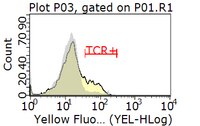Engineered secreted T-cell receptor alpha beta heterodimers.
Grégoire, C; Rebaï, N; Schweisguth, F; Necker, A; Mazza, G; Auphan, N; Millward, A; Schmitt-Verhulst, AM; Malissen, B
Proceedings of the National Academy of Sciences of the United States of America
88
8077-81
1991
显示摘要
We have produced a soluble form of a mouse alpha beta T-cell antigen receptor (TCR) by shuffling its variable (V) and constant (C) domains to the C region of an immunoglobulin kappa light chain. These chimeric molecules composed of V alpha C alpha C kappa and V beta C beta C kappa chains were efficiently secreted (up to 1 micrograms/ml) by transfected myeloma cells as noncovalent heterodimers of about 95-kDa molecular mass. In the absence of direct binding measurement, we have refined the epitopic analysis of the soluble V alpha C alpha C kappa-V beta C beta C kappa dimers and shown that they react with an anti-clonotypic antibody and two antibodies directed to the C domain of the TCR alpha and beta chains. Conversely, we have raised three distinct monoclonal antibodies against the soluble TCR heterodimers and shown that they recognize surface-expressed TCRs. Two of these antibodies were found to react specifically with the products of the V alpha 2 (V delta 8) and V beta 2 gene segments, respectively. When considered together, these data suggest that these soluble TCR molecules are folded in a conformation indistinguishable from that which they assume at the cell surface. | 1716770
 |
In vivo administration of monoclonal antibodies to the CD3 T cell receptor complex induces cell death (apoptosis) in immature thymocytes.
Shi, YF; Bissonnette, RP; Parfrey, N; Szalay, M; Kubo, RT; Green, DR
Journal of immunology (Baltimore, Md. : 1950)
146
3340-6
1991
显示摘要
Some thymocytes, upon activation via the TCR complex in vitro, undergo apoptotic cell death. In this report, we examine the cell death induced in the thymus after administration of anti-CD3 or anti-TCR antibodies. We found that shortly after antibody injection, cortical thymocytes undergo apoptosis as characterized by morphologic changes and DNA fragmentation. Anti-CD3 administration led to depletion of nearly all CD4+CD8+ thymocytes, and approximately 50% of CD4+CD8- thymocytes. This depletion predominantly affected cells bearing low levels of CD3, although some depletion also occurred among cells expressing intermediate and high levels. Administration of an anti-TCR antibody also induced apoptosis, but affected significantly fewer thymocytes than anti-CD3. This effect was probably not due to different binding affinities for the two antibodies, because both antibodies show similar dose response effects in an in vitro model of activation-induced apoptosis. This work demonstrates that findings on activation-induced apoptosis in vitro can be extended to the in vivo situation, and further, that the activation of cortical thymocytes, in situ, results in apoptosis and removal of the activated cells. The possible relationships between this activation-induced cell death in immature thymocytes and the process of negative selection of autoreactive T cells is discussed. | 1827483
 |
Characterization of a monoclonal antibody which detects all murine alpha beta T cell receptors.
Kubo, RT; Born, W; Kappler, JW; Marrack, P; Pigeon, M
Journal of immunology (Baltimore, Md. : 1950)
142
2736-42
1989
显示摘要
Research on the specificities, functions, and maturation of T cells would be greatly aided by a collection of monoclonal antibodies which distinguishes different types of TCR. With this end in mind hamsters were immunized and tested for production of pan-reactive anti-mouse alpha beta TCR antibodies. In this report we describe the properties and uses of a mAb, H57-597, produced from one of these animals. The mAb reacts with surface receptors on all alpha beta TCR-bearing cells and does not react with receptors on gamma delta+ T cells. In an immobilized form, this antibody can directly activate T cells bearing alpha beta TCR. It can be used in immunoprecipitation reactions to precipitate receptor from the appropriate cell types. In combination with anti-CD3, the antibody can be used in cytofluorographic analyses to measure numbers of CD3+, alpha beta+, and CD3+, gamma delta+ cells in the thymus and periphery. | 2467936
 |
Alpha beta T cell receptor and CD3 transduce different signals in immature T cells. Implications for selection and tolerance.
Finkel, TH; Marrack, P; Kappler, JW; Kubo, RT; Cambier, JC
Journal of immunology (Baltimore, Md. : 1950)
142
3006-12
1989
显示摘要
Ligand binding to alpha beta TCR has different consequences in thymocytes at different developmental stages, causing alternatively positive selection, clonal deletion, or activation. These various functional consequences may be due to changes in the signaling properties of the receptor complex during development. In this report we show that alpha beta TCR engagement on immature thymocytes has different effects on intracellular free calcium concentrations than alpha beta TCR engagement on mature T cells. In contrast, CD3 engagement on immature thymocytes and mature T cells has the same effect on intracellular free calcium, suggesting that altered signal transduction in immature thymocytes may be due to inefficient alpha beta TCR-CD3 coupling. These studies also suggest that in certain T cell populations, activation events resulting from ligation of CD3 may not accurately reflect the activation events resulting from ligation of the physiologic receptor, alpha beta TCR. | 2523422
 |











